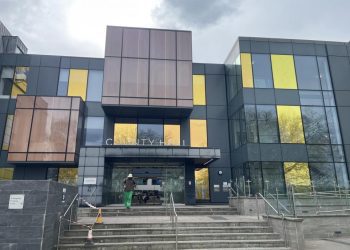A column about days gone by in Melksham by local historian Lisa Ellis
The Independent Chapel and Women’s Rights in the 1840s

A document I recently transcribed lists the baptisms performed at the Independent Chapel. This record is especially helpful in that, along with baptisms, a lot of them include birth dates – one of the ways I discover which day someone was born.
The following is taken from a Wiltshire Times article published on 9th November 1878 which reports a speech given during the 100-year services and to celebrate their renovations (what we now know to be the Rachel Fowler Centre).
One speaker, Rev. T. Mann, minister in Trowbridge, talked about the Chapel’s origins when he related how Rev. Honywill came to Melksham and how he’d gone on to remain as the minister for the Independent Chapel for almost 60 years. [Honywill and his family lived on King Street in what we now call “Legion House”.]
Quoting the article in bits: “The originator of the church whose centenary we celebrate to-day was John Honywill, its first pastor…He was a man of 21 years of age when he settled here…and died at the ripe age of 79, respected by all, leaving behind him a blameless life, a holy example, and an attached and flourishing church…At the time of his settlement here he was a student in the Countess of Huntingdon’s College of Trevecca, now of Cheshunt. It was never her ladyship’s will that her students should be idle, so they went out on preaching excursions, and thus Mr Honywill came about these parts. In Melksham, there were a few who wished him to settle here. He was so desired to settle in Frome, but the Melksham people prevailed with him and won his heart. He had not completed his college term, and the Countess furiously opposed his settlement, and ordered him peremptorily, as well she could, to return the itinerating pony belonging to her on which he had performed his preaching excursions, and the gown which he wore in conducting the services. If he were resolved to settle in Melksham, she was resolved that her connection with him should cease, and that pony, gown, and bands those be provided at the expense of the people of Melksham.”
The above gives a somewhat interesting anecdote of Mr Honywill’s arrival. But the speaker conjectured about how the countess’s reactions and Honywill’s actions might have caused some rules to be adopted for the government of the church in 1795.
Apparently, women were to be kept in due subjection, and were plainly shown what their place was to be in the church meetings.
Rule V. Witnesseth that every male member shall be fully at liberty to make any motion he may think proper, or to speak his mind on any subject that may be proposed.
Rule VI. Though female members may vote in the election of a minister and deacons, they shall have no voice in the election of other officers of the church, in the elections or expulsion of members, or anything relating to church government; but they may relate or attest facts provided it be found expedient.
Then Rev Mann gave his own political view (bear in mind the centenary was around the time women in general were rising up for their right to vote). “It is almost refreshing to us in these times of women’s rights advocacy to read such a deliverance as that.”
He then went on to explain that one of Mr Honywill’s successors “took it upon himself to kick over the traces, and at one sweep cleared the deck of all the rules.” It almost seems as though Rev Mann lamented the loss of rules, but conceded that after the rules were abolished, “they (women) have not troubled the peace of the church or assisted its order for a good many years past.”
Getting back to the entries in the Baptism book…
There weren’t that many and the book had other entries too, such as those adults who wanted communion, etc. But in three cases, there were entries about excommunicating people. Taking them off the list. Telling them to leave and never come back. People raised objections about their behaviour and they wanted them gone.
This surprised me because I always thought the Independent Chapel was very inclusive of all beliefs and less stringent than other religions (removing the archaic rules mentioned above).
But the entry that dropped my jaw mentioned Ann Honywill – the daughter of church founder John Honywill — and her cousin, the daughter of a former deacon of the same church.
This was noted in the book in 1845, nine years after the death of Ann’s father:
“At the meeting this evening it was decided to exclude two persons from the communion of the church and to request they with approval of others pain[*] no[*] whose uniform representation is that of discontent and dissatisfaction. The parties now excluded are Ann Honywill and Sarah Wilshere. Jeremiah Adams, James Knapp, Richard Mitchell and Michael Missom cause to be considered as belonging to this church, and those names are removed from the list of communicants.”
So what’s up with that?!?
[* those words were very faded and hard to read; no doubt I have transcribed them incorrectly]
NB – Ann Honywill and Sarah Wilshere were cousins. Ann was an unmarried schoolmistress. Ann, also unmarried, was the daughter of John Wilshire, who was a member of the independent church at Melksham for 43 years and a deacon for 30. “In him, the church has lost a friend, the poor a benefactor, and the family a kind and venerable parent.” Sarah died in 1858 when her heart ruptured; Ann in 1865, aged 84.
Support Local News
Help us keep your community connected and informed.
Local news is under pressure more than ever. For just £2 a month, you can support independent reporting that shares local stories, investigates the issues that affect you, and keeps residents up to date.
Choose a monthly subscription or a one-off donation. All donations will be reinvested into producing local journalism for Melksham.
Donate Now






















